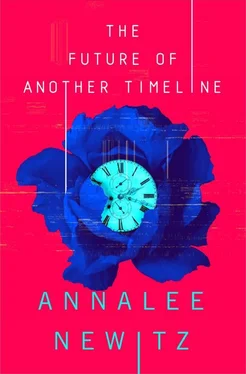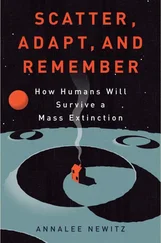We all started asking questions at once.
“Where is your mark?”
“What is that thing? Is that a weapon?”
“When are you from?”
“What past do you remember?”
She drummed a military rhythm on the table with her fingers, and the jumper parted over her traveler’s tattoo. “As you can see, I’m from exactly 512 years in your future. I came because my… colleagues and I believe that this era is the last common ancestor of our timeline and one that is strongly divergent.”
“What do you mean, ‘strongly divergent’?” I asked. I had never met a traveler who made these kinds of claims. Usually we talked about editing, not diverging.
“I didn’t come to change a few laws in the United States, or study the price of meat. This is something bigger. I had to come a long way back to make it happen.”
Our conversation about Raqmu and the archive caves was completely forgotten. I’d met future travelers when they gave lectures sponsored by the geoscience department, of course. But none had ever come to find the Daughters of Harriet specifically. If what Morehshin said was true, people still knew about our working group half a millennium from now. A hot, unfamiliar sensation of optimism spread through my ribcage. We had made a difference. Things would get better. Wading through the garbage can of history had actually been worth it.
Morehshin spoke again. “Obviously I’m not going to tell you about the past that I remember. It’s irrelevant anyway, since nothing I remember has happened yet.”
“What’s that?” Shweta pointed at the unidentifiable blob on the table, roving slowly.
“Evidence that I am serious. One thing I will tell you is that there’s a lot you don’t understand yet about the Machines. We can pull certain objects through with us—more than garb. And people. We can travel together, up to five at a time.”
C.L. was excited. “I thought that was one of the hard limits on the interfaces—no simultaneous travel. To stop people from bringing an army through, or maybe to prevent mass temporal abandonment when things get tough.”
Morehshin shrugged. “Your ignorance is not my problem. I’m here because of the edit war. The one you first described in your writing, Anita. In the subalterns’ cave.”
We all looked at Anita, whose face was morphing from disgruntlement to shock. “What… no. I haven’t left anything in a cave.”
“Somebody named Anita from the Daughters of Harriet left a detailed history of the edit war, starting with the Comstockers. Is that you?”
“No… it’s not me. At least, it’s not me now.”
Morehshin sucked in her breath at Anita’s implication. Exposing the future was a major violation, and apparently the taboo still held in this traveler’s present. Nobody was sure what to say next.
I broke the silence. “I’ve been tracking the Comstockers. What can you tell us about this divergence?”
“Nothing. Obviously. I’ve already been foolish with my words. But… we need to kill Anthony Comstock.” She pointed at the blob on the table. So it was some kind of weapon.
“You’re about a century too late for that.” I folded my arms.
Next to me, Anita looked like she’d eaten hot coals. Her voice came out in the clipped phonemes she used for arguing with old, tenured white men at academic conferences. “In addition, evidence suggests that killing and saving individual lives doesn’t affect the timeline. The Great Man theory has been disproven. Only social movements and collective action can change history.”
Now Morehshin looked frustrated. When she spoke, her unidentifiable accent thickened. “You take your sterile pleasure in hell, don’t you?” I got the feeling that she’d translated directly from some nasty future curse. “You know nothing about travel. You haven’t cracked layer one of the Machine interfaces. We have centuries of data demonstrating that we can change the timeline by targeting key individuals.”
Anita glanced at Berenice, and I knew what she was thinking. This traveler could be lying or wrong. Or she could be right. It was true that that we barely understood how history worked. Theories of timeline change went in and out of style; every geoscience student read about the many hypotheses that had been adopted and discarded, only to be adopted again with seemingly more nuance. Clearly the geoscientists of Morehshin’s time were in a Great Man phase. At least her sophisticated Machine techs hadn’t managed to deposit her in the right period. We still had a chance to stop her from killing anyone, and possibly making things worse when a more profoundly devious bastard rose up to take Comstock’s place.
“We have centuries of data too.” C.L. tapped their ancient laptop with a finger, as if all of history lived on its sad little hard drive.
I piled on. “Your data can’t be that great, if you overshot your target by over a century.”
Shweta made a wiping gesture with her hands. “Let’s stop arguing about theory. Can you tell us why you want to kill Comstock? That might help us understand your mission.”
“We believe that he’s the reason for the divergence. He started the process…” She searched for words. “He started misogyny? Does that make sense?”
Now I was really confused. “There was misogyny before Comstock. Can you be more specific?”
“No. I cannot.” Then her face softened. “But I will say that in my time it is worse. Much worse. We are dying out.”
I watched panic and mistrust distort everyone’s faces. Maybe the Daughters weren’t going to fix the timeline after all.
“Humanity is dying out? Like a species extinction?” C.L. sounded intrigued.
“Not humanity. Women. Queen type women who are… on our side.”
“Queen type?” Anita twirled a pen between her fingers. “You mean women with power?”
Morehshin shook her head. “More than power, but also less. You know I am saying too much already. I hope you will help me. This is our only chance.”
I thought about my disastrous conversation with Beth at UCI, and wondered if I’d sounded as crazy to her as Morehshin sounded to me now. Recalling Beth’s rejection, I felt a rush of sympathy for this traveler with her strange curses and stranger story.
“I know how to find Comstock, if you’ll promise not to kill him. I have a better plan. Maybe you can help.”
Morehshin pocketed the thing on the table. “We are all sisters.” She said it like a formal invocation. “Let us act as one.”
“Does that mean you won’t kill him?”
“I won’t kill him. Unless your plan is bad.”
“So what is your plan, Tess?” Anita sounded dubious.
“I told you I’ve been organizing with women in 1893. It’s collective action. For Comstock, there are things worse than death. We’re going to destroy his reputation.”
Morehshin’s snarl became a grin. “His individual reputation?”
“I guess you could say that.”
“I’m harmonized.”
I wondered how Morehshin had studied twenty-first-century English. Probably from flawed historical documents, or incomplete media files left in the archive caves. Sometimes she spoke in perfect idioms, and sometimes she sounded like bad translation software.
I looked at Anita. “I’m going to take her back to 1893 with me. It can’t hurt.”
“What the fuck, Tess. Of course it can hurt. Plus, you can’t take anyone with you anyway.”
“Well, Morehshin says she can take more than one person back. If she’s wrong, then we know she’s a fraud. If she’s right, then we’ve got a valuable ally in this edit war.”
Shweta took a deep breath. “I can’t believe I’m saying this, but I think Tess is right. Berenice was dead, and she’s probably not the only one. We need to do everything we can to stop the edit war and prevent these Comstockers from destroying the Machines.”
Читать дальше








![Аннали Ньюиц - Автономность [litres]](/books/424681/annali-nyuic-avtonomnost-litres-thumb.webp)



